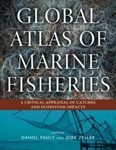Edited By: Edward Glazier
280 pages, 36 col plates, figs, tabs
![Ecosystem Based Fisheries Management in the Western Pacific Ecosystem Based Fisheries Management in the Western Pacific]()
Click to have a closer look
About this book
Contents
Customer reviews
Biography
Related titles
About this book
As the ecosystem-based trend in fisheries management continues to be implemented worldwide, a thorough background of this new management approach and resulting implementation strategies is needed. Ecosystem-Based Fisheries Management in the Western Pacific presents a full picture of the process changes used in switching from target species based management to EBFM, using a region that is at the forefront of this widely accepted movement. Ecosystem-Based Fisheries Management in the Western Pacific is the outgrowth of a series of three workshops convened by the Western Pacific Regional Fishery Management council.
The book follows the logical approach of each workshop, beginning with an assessment of the current state of fisheries management, transitioning through the data sources and modeling systems used to advance EBFM, and ending with practical methodologies for more thorough global implementation in the future. Contributed by experts from the Pacific regions as well as the UK and Non-pacific States, this book is one of the first available compendiums on this important movement and will be applicable to fisheries scientists and researchers, fisheries managers, policy makers, and social scientists worldwide
Contents
Foreword. Preface. Acknowledgments. List of Acronyms. Section 1: Ecosystem Science and Planning. Chapter 1. Introduction. Background. Workshop Goal and Objectives. Organization. Opening Discussion. Ms Kitty M. Simonds. Opening Presentations. Steve Murawski. Carl Walters. Paul Dalzell. Gerard DiNardo. Chapter 2. Data Sources. Fishery-Dependent Data. Kurt Kawamoto. Russell Ito. Michael Quach. Resource and Habitat Data. Russell Brainard. Frank Parrish. Bud Antonelis. Oceanographic Data. Russell Moffitt. Reconstructing Time-Series Catch Data. Dirk Zeller. References. Chapter 3. Ecosystem Models and Modeling. Lessons from Other Regions. Neil Gribble. Jerald Ault. Carl Walters. Villy Christensen. Patrick Lehodey. Jeffrey Polovina. References. Chapter 4. Ecosystem Indicators. David Kirby. Robert Wakeford. Mike Fogarty. David Witherell. References. Chapter 5. Discussion. Prelude to Breakout Group Discussion. Data Needs Working Group Report. Ecosystem Models Working Group Report. Indicators Working Group Report. References. Chapter 6. Synthesis. Summary Synthesis: Michael Orbach. Summary Synthesis: David Fluharty. Conclusions and Recommendations. Key Points 1. Recommendations. Additional Comments. Reference. Section 2: Ecosystem Social Science and Planning. Chapter 7. Background. Rationale and Questions for an EAFM in the Western Pacific. Purpose of the Social Science Workshop. Organization of the Chapter. Western Pacific Council Mission and Purview. Brief Overview of the Fisheries. A History of EAFM in the Pacific Islands. Pacific Islands and Ecosystems. The Antiquity of Ecosystem Concepts in the Region. The Ahupua'a and Other Forms of EAFM in the Pacific Islands. Formal Conceptual and Policy Background. References. Chapter 8. Introduction. Workshop Goal and Objectives. Introductory Presentations. Kitty Simonds. Paul Dalzell. Steven Murawski. Samuel Pooley. Michael Orbach. Susan Hanna. Reference. Chapter 9. Ecosystem Social Science Models. Jeffrey Johnson. Richard Pollnac. Lee Anderson. Tim Hennessey. Chapter 10. Social Science Data Sources. Bryan P. Oles. Susan Abbott-Jamieson. Peter Wiley. Island Context and Social Science Data Challenges and Solutions. Paul Dalzell. Craig Severance. Paul Bartram. Fini Aitaoto. Judith R. Amesbury. Jesse Rosario. John Gourle.y Chapter 11. Social and Economic Indicators and Applications for EAFM in the Pacific. Patrick Christie. Leah Bunce. Joeli Veitayaki. Leanne Fernandes. Leimana DaMate. References. Chapter 12. Synthesis: Toward Incorporating Social Science in EAFM. Drawing on Ancient Concepts and Practices. Existing Institutions and Institutional Parameters. Pursuing Ecosystem Goals and Objectives through Application of Social Science. Research and Monitoring of Direct Ecosystem Relationships. A Note on Social and Economic Indicators. Research and Monitoring of Indirect Ecosystem Relationships and Effects. Choices and Priorities. Elements of Social Science Approaches to EAFM in the Western Pacific Region. Addressing Variation with an Adaptive Approach. Steps for Incorporating Social Science in EAFM in the Region. References. Chapter 13. Summary Conclusions. Summary Points of Particular Relevance to Council FEP. Objectives. Concluding Discussion. Section 3: The Ecosystem Policy Workshop. Chapter 14. Introduction. Background. An Ecosystem Approach for the Western Pacific. A Vast and Complex Region. Addressing Uncertainties with an Adaptive and Incremental Strategy. The Suitability of EAFM Policy in the Western Pacific. Prelude to the Ecosystem Policy Workshop. Organization of the Chapter. References. Chapter 15. Ecosystem Policy. Objectives and Issues. Overview of Findings. References. Chapter 16. Opening Presentations. Kitty Simonds. Samuel Pooley. Michael Orbach. David Fluharty. Paul Dalzell. David Kirby. Frank Parrish. Susan Hanna. Stewart Allen. Chapter 17. Policy for Indigenous Resource User Groups. David Kirby. John Gourley. Judith Amesbury. Fini Aitaoto. Leimana DaMate. Colin Kippen. Paul Dalzell Chapter 18. Options for Community and Agency Interaction. Paul Dalzell. Jared Makaiau. References. Chapter 19. Conclusions and Recommendations. Overview. Potential Benefits of the EAFM. Summary Recommendations for Maximizing the Benefits of the New Approach. Biophysical Workshop Recommendations Reiterated. Social Science Ecosystem workshop Recommendations Reiterated. Policy Workshop Recommendations for Enhancing Participation. Policy Workshop Recommendations for Identifying Fiscal and Human Resources. Conclusions and Final Recommendations. References. Appendix A: Speaker Biographies. Appendix B: Select Demographic Tables. Appendix C: Select Maps of the Study Region. Index. Color Plates.
Customer Reviews
Biography
Edward Glazier is Vice-President of Impact Assessment, Inc., a firm specializing in social-environmental research along the coastal zone of the U.S. and abroad.
Edited By: Edward Glazier
280 pages, 36 col plates, figs, tabs

















![Les îles Saint-Paul et Amsterdam (Océan Indien Sud): Environnement Marin et Pêcheries [Saint-Paul and Amsterdam Islands (South Indian Ocean): Marine Environment and Fisheries]](http://mediacdn.nhbs.com/jackets/jackets_resizer_medium/26/260268.jpg?height=150&width=107)

















